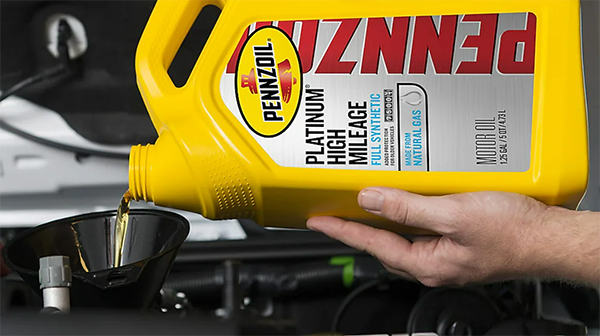To help maintain high performance and a longer life expectancy for your engine, engine oil is essential. Not only does it help lubricate your vehicle’s engine, it also provides many additional benefits, such as reducing friction and wear on moving parts, cooling the engine, and keeping it clean.
Engine oil keeps everything running smoothly and protects your engine from damage, which can improve your vehicle’s mileage. Below are the answers to the five most frequently asked questions about motor oil so you can learn how to help maintain a longer engine life and prevent mechanical breakdowns.
1. What are the main functions of motor oil?
Engine oil helps lubricate the various moving parts of the engine while helping to reduce friction and prevent engine wear. Motor oil also incorporates additives to help neutralize acids, manage combustion byproducts, prevent thermal breakdown, and help keep metal surfaces clean. Finally, it is there to help regulate the temperature of the engine and protect it from corrosion. Practicing proper lubrication maintenance is imperative to maintaining engine performance and engine life expectancy.
2. How do I know what grade of motor oil to use?
When deciding on the type of motor oil for your vehicle, consult your owner’s manual to see what type of SAE viscosity motor oil is recommended for that specific vehicle. Engines are built to specific standards and specifications to ensure performance, protection and engine life. Be sure to choose the type of oil viscosity recommended for your vehicle, as the wrong type can decrease engine performance and possibly damage it. If you’re not sure what type of motor oil your vehicle needs, check out the Pennzoil Oil Selector. Here you can enter your vehicle make and model to confirm which Pennzoil motor oil is right for you.
3. What are the different types of motor oil?
There are four different varieties of motor oil: high mileage motor oil, synthetic motor oil, synthetic blend motor oil and conventional motor oil. A special oil such as high mileage motor oil is specially formulated for older engines with 75,000 miles or more. It is designed to slow the effects of wear and reduce oil consumption due to wear. Synthetic motor oil is the most premium option that goes through a chemical engineering process, such as Pennzoil Platinum motor oils. It is designed for superior high and low temperature performance, wear protection, better fuel economy and to maintain engine cleanliness.

4. What are the signs that you are low on engine oil?
The most obvious and initial sign of low engine oil in your vehicle is the check engine light appearing on your vehicle’s dashboard. Another sign may be a smell of burnt oil, strange noises or reduced engine performance. Maintaining proper oil levels can help you avoid engine wear or damage from low oil levels. It is essential to check the oil level regularly to prevent damage to the vehicle.

5. How often should I change my vehicle’s engine oil?
Changing your vehicle’s engine oil can vary based on a number of conditions. Driving styles, vehicle age, severity of use and weather conditions can all affect how your engine performs. Mileage, type of oil used, and oil quality can also influence oil performance and drain interval. Following your vehicle owner’s manual on how often to change your oil is the most beneficial way to maintain and extend the life of your engine. Since every vehicle and engine is different, the best preventative maintenance is regular oil changes and regular oil level checks.
Regular oil maintenance (oil changes) and keeping the oil level at an optimal level help regulate proper lubrication, remove contaminants and prevent oil starvation, which can lead to wear, poor performance of the engine and shorten the life of the engine over time.


